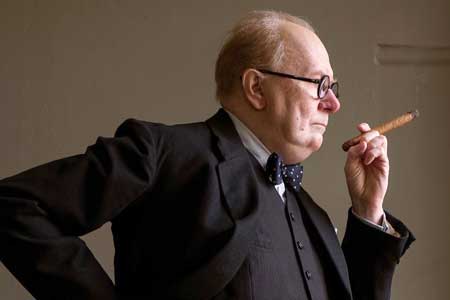Film (2017)
Directed by Joe Wright
Screenplay by Anthony McCarten
Music by Dario Marianelli; Cinematography by Bruno Delbonnel; Film Editing by Valerio Bonelli
With Gary Oldman (Winston Churchill), Lily James (Elizabeth Layton), Kristin Scott Thomas (Clemmie), Ben Mendelsohn (King George VI), Ronald Pickup (Neville Chamberlain), Stephen Dillane (Viscount Halifax), Nicholas Jones (Sir John Simon), Samuel West (Sir Anthony Eden), David Schofield (Clement Atlee), David Strathairn (President Roosevelt)

in “Darkest Hour”
Image: Jack English/Focus Features
Not only is this an excellently crafted film, but its writing, by Anthony McCarten, is subtle and interesting. Its story is the time of transition from Neville Chamberlain’s acquiescent, peace-treaty-oriented, appeasement stance vis a vis Hitler, to Churchill’s highly energized opposition.
The film does a very good job of marking that transition and depicting with considerable subtlety the influences on Churchill that compromised his initial inclination to take up arms against Hitler in direct battle.
At the time of Churchill’s ascent to power, the Nazis had cornered the British army on the beaches of Normandy. Four hundred thousand British troops were under threat of extinction by German troops and warplanes. While Chamberlain and his associates argued for accommodation of Hitler, Churchill voiced strong opinions about opposing him, though the military odds seemed horrific.
After much deliberating and argument, Churchill came up with the idea of calling up a civilian force of private boats to ferry the troops back from Normandy tO England. His idea worked, and the famous story of Dunkirk resulted in the saving of many of those hundreds of thousands of British troops.
The story is interestingly told, both with lots of depiction of Churchill in conversation with Chamberlain and his ilk, and with the king, who hesitatingly accepted Churchill as prime minister, and then rallied behind him.
A secretary, Elizabeth Layton (Lily James), adds dimension and personal access to Churchill’s personality, as, to some extent, does Churchill’s wife’s portrayal by Kristin Scott Thomas. Would that every leader had such an understanding, supportive and accommodating partner.
Cinematography and editing are exceptionally well done, and the music by Dario Marianelli is distinctively good. It truly enhances the sense of drama in an effective way.
Gary Oldman does a very serviceable job as Churchill. Given all the makeup and facial consTruction required to transform him into Churchill, one can barely distinguish him from John Lithgow. Oldman’s delivery of Churchill is appropriately blustery, and sometimes the grumbling and mumbling – no doubt true to character – wind up making one wish there were subtitles.
Darkest Hour is a nice companion piece to the recently released Dunkirk, which tells the story from the perspective of the soldiers on the beach and the pilots of boats gone to get them. Darkest Hour shows the behind the scenes maneuvering which affected those depicted most graphically in Dunkirk.
As well, Darkest Hour is, in a funny way, a good companion piece to the concurrently running The Post, about Katharine Graham’s decision to publish The Pentagon Papers in 1971. Though the settings are very different, the portrayals of great leaders with character and pizzazz are quite similar. And the subtlety of the depictions of their decision making under duress is very similar and similarly well done.
The characterization of leadership as idiosyncratic but thoughtful is most welcome at the current stage of American political life in which the idiosyncratic often diverges strongly from thoughtfulness. In Darkest Hour, Churchill’s idiosyncratic ways are shown as enabling him to craft a stance and lead a country with masterful and eloquent forthrightness. That kind of innovation in leadership is quite different from an unfortunately more currently familiar form of idiosyncratic gesturing that is random, reactive and not self-possessed, exhibiting an episodic whimsy that represents the opposite of capable and coherent leadership.
– BADMan
Leave a Reply